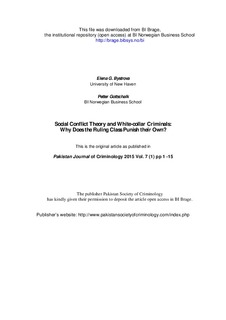| dc.contributor.author | Bystrova, Elena G. | |
| dc.contributor.author | Gottschalk, Petter | |
| dc.date.accessioned | 2015-08-27T11:42:46Z | |
| dc.date.available | 2015-08-27T11:42:46Z | |
| dc.date.issued | 2015 | |
| dc.identifier.citation | Pakistan Journal of Criminology 2015 Vol. 7 (1) pp 1 -15 | nb_NO |
| dc.identifier.issn | 2074-2738 | |
| dc.identifier.issn | 2222-6648 | |
| dc.identifier.uri | http://hdl.handle.net/11250/298089 | |
| dc.description | This is the originally published version of the article. The publisher Pakistan Society of Criminology has kindly given their permission to deposit the article open access in BI Brage. | nb_NO |
| dc.description.abstract | Social conflict theory suggests that the professional powerful and wealthy represent the elite
and ruling class in society. The theory holds that laws and law enforcement are used by the
dominant group to minimize threats to their interests. The justice system is biased and
designed to protect the ruling class. Sanctioning of laws enables the dominant class to
pressure a domestic order that allows its interests to be promoted and maintained. This article
addresses the issue of deviant behavior by members of the ruling class. Specifically, it
addresses the issue of law breaking by white-collar criminals. Reasons for law enforcement
towards members of the elite are discussed in this article, including conflict reduction and
class obedience. A research model is developed for predictors of white-collar crime
prosecution. | nb_NO |
| dc.language.iso | eng | nb_NO |
| dc.publisher | Pakistan Society of Criminology | nb_NO |
| dc.title | Social Conflict Theory and White-collar Criminals: Why Does the Ruling Class Punish their Own? | nb_NO |
| dc.type | Journal article | nb_NO |
| dc.type | Peer reviewed | nb_NO |
| dc.source.journal | Pakistan Journal of Criminology | nb_NO |
| dc.description.localcode | 1, Forlagsversjon | nb_NO |
